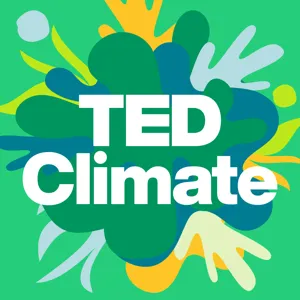Podcast Summary
Exploring climate solutions and reducing stress with Penn Badgley, Monica Araya, Canva, Slack, and more: Join Countdown for climate action, electrify transportation, use Canva for stress-free presentations, streamline communication with Slack, and consider lifestyle changes for a cleaner world.
There are various initiatives and tools available to help individuals and businesses take meaningful action towards climate solutions and reduce stress, while also making a difference in critical environmental issues. Penn Badgley invites listeners to join Countdown, TED's new global initiative to accelerate climate solutions. Monica Araya, an electrification advocate, shares her insights on the topic. Canva offers a stress-free solution for work presentations and writing with AI-powered features. Slack provides a collaborative platform for businesses to streamline communication and automate tasks. The Colorado River's future hangs in the balance, and a 28-year-old may hold the key to a historic compromise. Meanwhile, the lockdowns of 2020 have given us a glimpse of a cleaner, quieter world, sparking questions about our lifestyle choices and the potential for a big detox in transportation.
Reducing tailpipe emissions and promoting environmental justice: Cities worldwide are banning petrol and diesel cars, prioritizing active mobility, and making city spaces greener to reduce tailpipe emissions, improve air quality, and promote environmental justice. Amsterdam plans to go emissions-free by 2030.
The tailpipe symbolizes harmful habits we've accepted for too long, including the burning of vast amounts of oil, air pollution, and its disproportionate impact on the poor and minorities. However, there's reason for optimism. Cities worldwide are responding to public demands for clean air by banning petrol and diesel cars, prioritizing active mobility, and making city spaces greener and more pedestrian-friendly. For instance, Amsterdam, a city known for its cycling culture, is planning to go emissions-free by 2030. The city's plan includes phasing out emissions from all transportation, including cars and motorcycles, by expanding a zero-emission zone. This shift towards sustainable transportation is crucial in reducing tailpipe emissions, improving air quality, and promoting environmental justice.
Transitioning to electric mobility and renewable energy: Cities, governments, and industries are making progress towards emissions-free transportation powered by renewable energy, but more investment from the financial industry is needed to accelerate the transition away from fossil fuels.
The shift towards electric mobility and reducing carbon emissions is a systemic change that requires all modes of transportation to go emissions-free and be powered by renewable energy. Cities, national governments, and industries are making strides towards this goal with milestones such as phasing out petrol and diesel cars, electrifying vehicle manufacturing, and increasing the availability of public charging plugs. The technologies needed for this transformation, such as batteries, are commercially available, getting cheaper, and improving. However, more urgency and directionality from the financial industry is needed to make the necessary investments in this transition away from fossil fuels. This transition, which includes electrifying transportation, is essential to meet the societal imperative of halving carbon emissions by 2030.
Embracing the shift towards electric transportation: Combining innovative financing and forward-thinking policies can accelerate the transition towards a sustainable transportation system and prepare for potential economic dislocation and job disruption.
To accelerate the transition towards a sustainable transportation system, a combination of innovative financing and forward-thinking policies is essential. This was highlighted in the discussion about the rapid electrification of buses in certain regions, such as Santiago de Chile and China. Change may bring challenges, including economic dislocation and job disruption, but preparing for these transitions through just policies can help mitigate these issues. The end of the internal combustion engine is approaching, and the timeline depends on our actions this decade. It's time to embrace this change and work towards a future with cleaner air, thriving economies, and people-friendly streets. The shift towards electric transportation is not only necessary for the climate but also for our health. Let's seize this opportunity and make the transition as smooth and beneficial as possible.





 Liz Burdock, Executive Director of the
Liz Burdock, Executive Director of the 